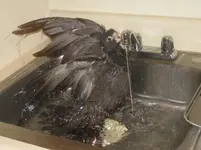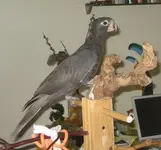They only go bald during breeding season and it's only the females...
Vasa Parrot Facts- Feather Tree
I have a very interesting VASA story as a matter of fact. When I lived in NORCAL... It was a very odd situation, but a family of crows showed up in my tree, and one of the "crows" started talking to me...
Well, of course I talked back...
And on closer inspection it was a VASA... well, those puppies are RARE... SO I KNEW IMMEDIATELY THIS WAS A LOST PET... so I tried to keep it's interest, and tried to bribe it down with a cage and food bowls. It did the flippy flappy thing, and thought about it, but didn't fly down....
So I climbed the tree...
Got to within a few branches of the bird, but the crows spooked and flew off, and when "the flock" left she went with them...
So I immediately posted on the old ParroTalk site, and within a few hours had an answer from someone who was missing a Vasa... (yeah, there were like a grand total of, like, six of them in California... so... )
Turns out this was an escaped breeder, and she had a mate. She had hooked up with a flock of fairly similar looking crows, and was following them around everywhere they went. Bottom line, the lady brought the mate over to my place for a couple of weeks, hoping that the mate would attract her back...
The flock never reappeared in my yard, but I did get to play with a vasa for two weeks. Very interesting personalities...
Very playful birds.




